Le Samouraï Blu-ray Movie
HomeLe Samouraï Blu-ray Movie 
Criterion | 1967 | 105 min | Rated PG | Nov 14, 2017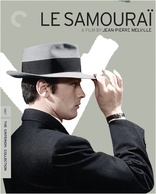
Movie rating
8.2 | / 10 |
Blu-ray rating
| Users | 4.0 | |
| Reviewer | 4.5 | |
| Overall | 4.0 |
Overview
Le Samouraï (1967)
After carrying out a hit on a nightclub owner, hitman Jef Costello discovers a witness to the killing. Before he can act, he is arrested in a sweep of suspects. Released after the witness fails to come forward, Costello goes from being the hunter to the hunted.
Starring: Alain Delon, François Périer, Nathalie Delon, Cathy Rosier, Jacques Leroy (I)Director: Jean-Pierre Melville
| Drama | Uncertain |
| Foreign | Uncertain |
| Film-Noir | Uncertain |
| Crime | Uncertain |
| Mystery | Uncertain |
| Thriller | Uncertain |
Specifications
Video
Video codec: MPEG-4 AVC
Video resolution: 1080p
Aspect ratio: 1.85:1
Original aspect ratio: 1.85:1
Audio
French: LPCM Mono (48kHz, 24-bit)
Subtitles
English
Discs
50GB Blu-ray Disc
Single disc (1 BD)
Playback
Region A (locked)
Review
Rating summary
| Movie | 5.0 | |
| Video | 4.0 | |
| Audio | 5.0 | |
| Extras | 4.0 | |
| Overall | 4.5 |
Le Samouraï Blu-ray Movie Review
Reviewed by Dr. Svet Atanasov October 11, 2017Jean-Pierre Melville's "Le Samourai" (1967) arrives on Blu-ray courtesy of Criterion. The supplemental features on the disc include an original trailer for the film; archival interviews with critic Rui Nogueira and film historian Ginette Vincendeau; Olivier Bohler's documentary "Of Honor and Of Night"; archival interviews with Jean-Pierre Melville, Alain Delon, Nathalie Delon, Francois Perier, and Catrhy Rosier; and more. The release also arrives with a 30-page illustrated booklet featuring an essay by film scholar David Thomson, an appreciation by filmmaker John Woo, and excerpts from Melville on Melville. In French, with optional English subtitles for the main feature. Region-A "locked".
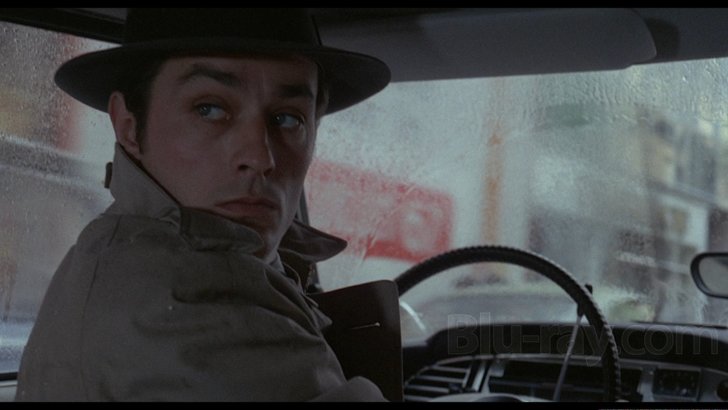
The lone wolf
Nine out of ten people who have seen Jean-Pierre Melville’s Le Samourai will tell you that it is one of the ‘coolest’ gangster films ever made. If you engage them in a conversation, you will then quickly realize that they are not just casual viewers either. These are the type of knowledgeable people who usually view hundreds of different films each year.
So, what is it that they are all seeing in Le Samourai that makes it so special?
The ‘cool’ is a combination of two things, really. The first is the very unique ambience that Melville creates and then uses as a key element of the narrative. Basically, instead of focusing on the action or evolving nature of various straightforward relationships as traditional gangster films typically do, Melville completely drains the glamour and makes them look casual. So, all of the clichéd dramatic buildups and climaxes instantly become pointless, and the film acquires a brand new identity.
The second is the equally unique way in which Alain Delon plays Jef Costello, the lone wolf that Melville’s camera follows. He looks good, but he also looks strikingly elegant. This professional killer is like a former model gone rogue who now uses his gun as well as he once used his looks. Of course, the brilliant trick is that he does it in a way that makes you think he could not care less about his other 'weapon', but he is just that good -- a chameleon killer that knows exactly how to blend in, distract, and then finish off the job that he was hired to do.
There is something else that separates Le Samourai from other gangster films as well. There is a very interesting western vibe that runs through it, though, because Costello operates in a large European city with overcrowded streets and chic jazz clubs, it almost seems odd to acknowledge its existence. But pay close attention to the manner in which Costello goes about his business, and you will quickly discover plenty of similarities with how various great gunslingers are profiled in the classic American westerns. At times, Costello even faces off his opponents as if he is challenging them to an old-fashioned duel. (The prolific Hong Kong director and producer Johnnie To, a great admirer of Le Samourai, has actually incorporated this particular aspect of Melville’s film in many of his popular high-octane action thrillers).
Melville parts ways with Costello in perhaps the only way that makes perfect sense. In fact, the finale pretty much legitimizes the ‘cool’ because it is yet another form of rejection of the conventional rules that traditional gangster films follow. It is bold but casual, unexpected but unforgettable. Melville does not just abruptly clean up the mess and dispatch Costello into the night; he correctly preserves his integrity, and with it that of the entire film.
After Le Samourai Delon appeared in two other Melville films, Le Cercle Rouge and Un flic, both boasting very similar ambience. Two of these three films, Le Samourai and Le Cercle Rouge, were lensed by one of the greatest French cinematographers from the last century, Henri Decae.
Le Samouraï Blu-ray Movie, Video Quality 
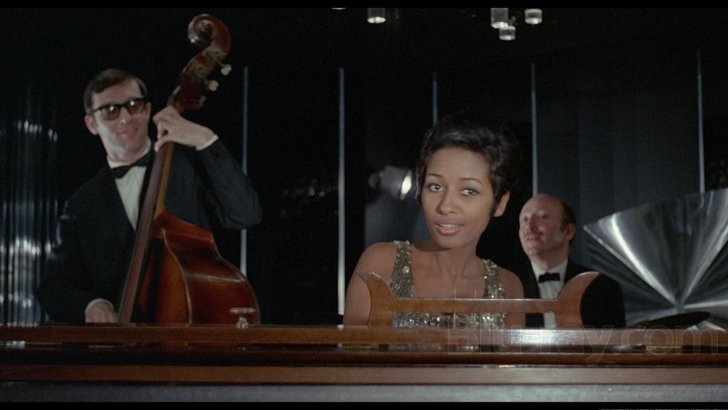
Presented in its original aspect ratio of 1.85:1, encoded with MPEG-4 AVC and granted a 1080p transfer, Jean-Pierre Melville's Le Samourai arrives on Blu-ray courtesy of Criterion.
The following text appears inside the booklet provided with this Blu-ray release:
"This high-definition digital transfer was created on a Spirit DataCine from the 35mm original camera negative and a 35mm interpositive. Thousands of instances of dirt, debris, scratches, splices, and warps were manually removed using MTI Film's DRS, while Digital Vision's Phoenix was used for jitter, flicker, small dirt, grain, and noise management. The soundtrack was mastered at 24-bit from the 35mm magnetic audio track. Clicks, thumps, hiss, hum, and crackle were manually removed using Pro Tools HD and iZotope RX.
Telecine supervisor and colorist: Jean-Marc Moreau/VDM, Paris."
It is pretty clear now that the folks at Criterion stayed away from Pathe's restoration of Le Samourai -- and it was the right thing to do. Indeed, having tested the French release I can confirm that the French master is very problematic and even on mid-size screens there is a range of digital anomalies that make the film virtually unwatchable. (For reference, Pathe's release of the 4K restoration of Valerio Zurlini's The Desert of the Tartars has many of the same issues).
What I see tells me that an older master was accessed and then specific digital work was done to optimize it as best as possible to make this upcoming release possible. The end result is very good, and when compared to Pathe's release vastly superior. A lot of the daylight and well-lit footage, for instance, boasts pleasing clarity and a type of delineation that was basically lost on the French release despite the fact that it was sourced from a higher quality master. It is during the darker/nighttime footage where it becomes clear that the density levels should be better -- basically, the image looks a tad more 'loose' -- but clarity is never compromised. Depth is consistently pleasing, but again, there are areas of the film where edge definition does not have that clean and sharp appearance a proper 4K master would ensure. On the other hand, there isn't even a whiff of digital tinkering of the type that catalog releases from Universal's vaults typically exhibit, so overall the film has a very solid organic appearance. Colors are nicely saturated and balanced, with plenty of good and healthy nuances. I probably would have preferred a slightly colder primaries, but I still like the current balance a lot. A bit of black crush sneaks in, but it won't impact negatively your viewing experience (see screencapture #5). Image stability is excellent. Lastly, there are no large distracting debris, cuts, damage marks, stains, or warped or torn frames to report in our review. All in all, given the circumstances I think that Criterion made all the right calls, and as a result delivered a huge gift to fans of Le Samourai that were patiently waiting and hoping for a proper organic release to emerge in the United States. (Note: This is a Region-A "locked" Blu-ray release. Therefore, you must have a native Region-A or Region-Free player in order to access its content).
Le Samouraï Blu-ray Movie, Audio Quality 
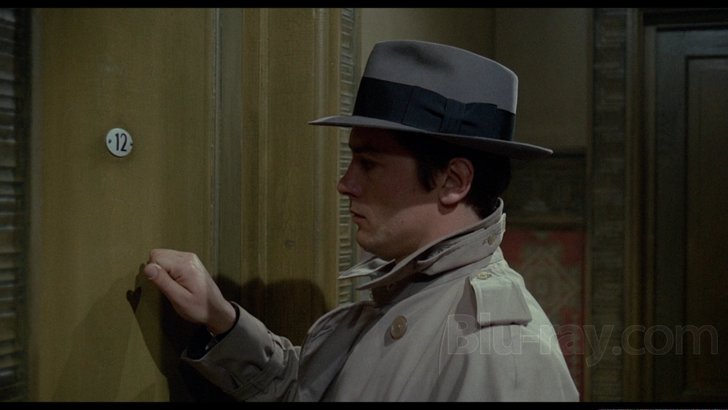
There is only one standard audio track on this Blu-ray release: French LPCM 1.0. Optional English subtitles are provided for the main feature.
The lossless track is stable and very clean. Dynamic balance is also excellent, and even though Le Samourai is a film in which silence actually has a very prominent role, there are various sections where small sounds and noises emerge in ways that a good lossless track must handle with precision. The lossless track does precisely that. The dialog and the music from the nightclub also sound great.
Le Samouraï Blu-ray Movie, Special Features and Extras 

- Trailer - original French trailer for Le Samourai. In French, with optional English subtitles. (4 min, 1080p).
- Authors on Melville - presented here are two archival interviews with critic Rui Nogueira and film historian Ginette Vincendeau.
1. Rui Nogueira - Rui Nogueira highlights the unique qualities of Le Samourai and discusses the specific period from Jean-Pierre Melville's life in which the film emerged as well as his working methods. In French, with optional English subtitles. (13 min, 1080i).
2. Ginette Vincendeau - Ginette Vincendeau discusses Jean-Pierre Melville's career and the evolution of his style (and specifically its precision and minimalist qualities), the success his films had at the box office, the masculinity of his work, his professional relationship with Alain Delon and Jean-Paul Belmondo, the prominent role that silence had it his film, the origin of Le Samourai, etc. In English, not subtitled. (19 min, 1080i).
- The Lineup - presented here is a collection of clips from archival interviews in which Jean-Pierre Melville, Alain Delon, Nathalie Delon, Francois Perier, and Catrhy Rosier discuss Le Samourai and its director's unique style. The excerpts are presented courtesy of the Institut national de l'audiovisuel in Paris, and were originally broadcast on French TV between 1967 and 1982. In French, with optional English subtitles. (25 min, 1080i).
1. Jean-Pierre Melville
2. Fire at Rue Jenner Studio
3. Alain Delon
4. Nathalie Delon
5. Cathy Rosier
6. Francois Perier
- Melville-Delon: d'honneur et de nuit/Of Honor and Of Night - this documentary film focuses on the professional relationship between Jean-Pierre Melville and Alain Delon and the production history of Le Samourai. Included in it are interviews with producer Laurent Grousset, and directors Remy Grumbach, Rui Nogueira and Volker Schlöndorff (The Tin Drum). The documentary was directed by Olivier Bohler in 2011. In French, with optional English subtitles. (24 min, 1080i).
- Booklet - 30-page illustrated booklet featuring an essay by film scholar David Thomson, an appreciation by filmmaker John Woo, and excerpts from Melville on Melville, as well as technical credits.
Le Samouraï Blu-ray Movie, Overall Score and Recommendation 
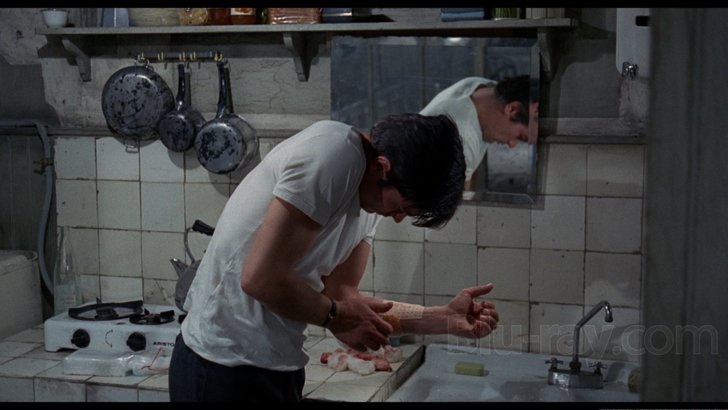
Jean-Pierre Melville's Le Samourai is the second major classic French film with Alain Delon to be saved by the folks at Criterion. A couple of years ago StudioCanal delivered an unwatchable 4K restoration of Rene Clement's Purple Noon, and had it not been for Criterion's decision to go in a different direction, right now we would not have a proper release of this very beautiful film. The situation with Le Samourai is essentially the same because the restoration that emerged via Pathe in France is yet another major misfire. The ideal scenario for Le Samourai would have been to have a proper 4K restoration and use it for a gorgeous presentation, but all things considered, this upcoming release actually feels like a gift for fans of the film. VERY HIGHLY RECOMMENDED.
Similar titles
Similar titles you might also like

High and Low 4K
天国と地獄 / Tengoku to jigoku
1963

Le Cercle Rouge 4K
Uncut Version | includes remastered BD
1970

Stray Dog
野良犬 / Nora inu
1949

The Big Heat 4K
1953

Kiss Me Deadly
1955

The American Friend
Der amerikanische Freund
1977

Bullhead
Rundskop
2011

Memories of Murder
살인의 추억 / Salinui chueok
2003

Whirlpool
Limited Edition to 3000
1950

The Killers
1946

Rififi
Du rififi chez les hommes
1955

The Long Goodbye
4K Restoration
1973

Insomnia
1997

Decision to Leave 4K
헤어질 결심 / Heojil kyolshim
2022

Elevator to the Gallows
Ascenseur pour l'échafaud
1958

Killer's Kiss 4K
1955

The Shadow on the Window
1957

Quai des Orfèvres
1947

Shaft's Big Score!
Warner Archive Collection
1972

In the Heat of the Night 4K
1967
